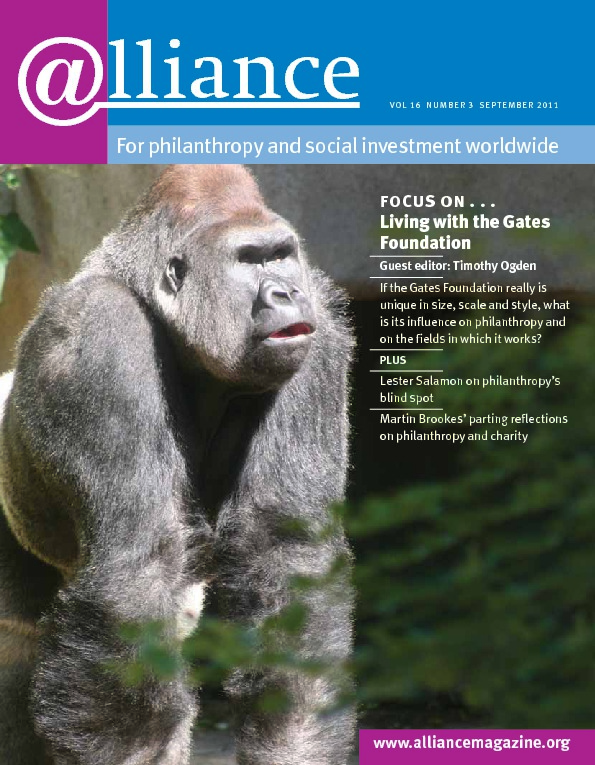This year’s Indian Philanthropy Forum was held in Mumbai on 29 June. Sponsored by the Ajay Piramal group, the Godrej group and the Rothschild Foundation and hosted by Dasra, the forum saw over 175 attendees. There were a number of panels and guest speakers representing different spectrums of the social sector: from Acumen Fund on the investing side and Bain Consulting, who have published a report on Indian philanthropy, to Muktangan, a grassroots education NGO, and TB Alliance, an NGO dedicated to eradicating tuberculosis.A unique aspect of the forum was the ‘coffee with philanthropists’ series that used parent-child duos to highlight generational approaches to philanthropy. This is where I come in. I was honoured to be invited to speak along with my father, Hemendra Kothari. My father set up the Hemendra Kothari Foundation, devoted to education, healthcare and the environment, a few years after he sold his financial services company to Merrill Lynch (now Bank of America). Speaking candidly at the IPF, he discussed some of the challenges he has faced over the years. Sceptics, for instance, felt that his giving was motivated by personal agendas: did Hemendra Kothari found the Wildlife Conservation Trust because he wanted to set up his own wildlife lodge? He regretted poor choices he might have made along the way by giving to organizations not equipped to realize their goals. Not disheartened by some of these errors in choice, as it were, he has remained hopeful: it was never meant to be a smooth ride. Only through such experiences could one learn to give more effectively.It was my turn next. Firstly, I feel the Indian media have paid little attention to the subject. Philanthropists are perhaps partly to blame. People in India are reticent to speak openly about their acts of giving. We need to be mindful of this. How will others follow if there are no role models to set the course? I would urge every philanthropist to speak to newspapers, magazines, and even casually to friends. Let’s create an atmosphere where it is not considered ‘bragging’ but rather motivational and informative. Giving needs to be made somewhat fashionable and only the media can help.The print media also needs to dedicate more space to research papers on social issues that highlight areas in need of the most support. Solution-oriented giving in areas of passion as opposed to plain passionate giving ought to be encouraged. For instance, if one’s area of interest is education, it’s prudent to investigate areas in the field that require the most attention before making a commitment, and to research where exactly in this area one’s money is most needed. Such due diligence may reveal the need for an improvement in the quality of education rather than a simple upgrade in existing physical infrastructure (building a new school or repairing an existing school).Another idea is to assign a neutral NGO, such as Dasra, which advises both philanthropists and NGOs/social enterprises, a weekly column to discuss social issues and to recommend credible NGOs doing good work in the field. People who want to give are sometimes reluctant because they do not know where or how to give. Credibility, accountability and transparency are sometimes weak in NGOs and a credible organization such as Dasra could inspire confidence and mitigate doubts.My second point was eloquently expressed by Satyanarayan Bansal, chief executive of Barclays Wealth India, who spoke about the view that charities are perceived as inefficient, and it is this perception that could discourage free giving. I echoed his point by emphasizing the need to professionalize NGOs by encouraging them to have a roadmap for the future. This roadmap would include plans to build a robust corpus with a sound investment plan alongside a succession plan for the management. When it comes to family trusts, efforts should be made to keep them as professionally managed as possible, away from direct family emotions and influence, which could hamper the mission of the organization if subsequent generations were to lose interest. It is important, moreover, to clearly define the goals and keep the overarching objective always in mind so that any differences in opinion can be successfully resolved.Our exchange was followed by a mother and daughter pair, Sangita and Tanvi Jindal, who discussed the different attitudes, apprehensions and feelings today’s parents have towards their children’s interest in working with NGOs.Finally, all kudos must go to Dasra, which has been the catalyst to change the way modern Indian philanthropists and NGOs view the age-old tradition of giving.Aditi Kothari is executive vice-president at DSP BlackRock InvestmentEvent Indian Philanthropy ForumDate 29 June 2011 Location Mumbai, IndiaOrganizer DasraHemendra Kothari FoundationThe Hemendra Kothari Foundation is devoted to education, healthcare and the environment. The focus on healthcare and education comes from a longstanding commitment to these areas in the form of legacy trusts set up by his family.He has also formed a separate entity devoted to the conservation of wildlife. The Wildlife Conservation Trust (WCT) collaborates with NGOs and aligns itself with the government to problem-solve for the many stakeholders involved in saving India’s forests and wild animals. Further, it helps fund NGOs that are actively involved in health and education initiatives around national parks and makes communities that reside in forest areas aware of the importance of India’s jungles.
Subscribe now from only £45 a year!
This article is only available for our subscribers
Existing users can login here




